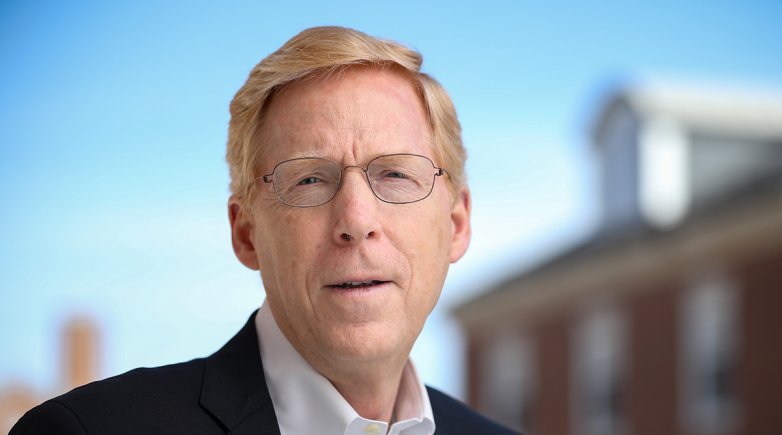The community within us

I write to you during a historic moment in time for the Academy, our country and the world. Nearly 4 billion people around the globe are under orders to shelter at home to combat the spread of the COVID-19 virus. Our federal government has approved the largest economic relief package in the history of our country. We see daily on the news and social media the impact of the virus and the heroics of those on the front lines, and we feel the fragility of this moment. More than ever, we have sought new ways of building and sustaining community, and we derive inspiration, strength and comfort from those around us. It’s no different at Exeter.
When we made the decision in March to adopt a remote learning plan for the entirety of the spring term, we did not doubt it was the right choice to protect the health and well-being of our community members. It was, nevertheless, a difficult one. Exeter thrives because of the people it brings together, the community they create, and what they learn from each other around the Harkness table, in the dorms, or on the fields or stage. How do we replicate that online? The short answer is that we cannot, not exactly. As we urge our students and employees to practice self-care and to put their families first, and as we strive to create an equitable online experience for students around the world, our virtual spring term will be entirely unique. And yet, it will also be entirely Exeter.
I believe our Harkness pedagogy gives us an enormous advantage, in that our students are accustomed to taking responsibility for their own learning. They like to do so, and they like to learn from each other. Our faculty has also stepped up in extraordinary ways under a compressed timeline to build an online experience centered on academic excellence, equity and inclusion. Their predominantly asynchronous learning model maximizes student and teacher flexibility and student independence, and our teachers are working hard to ensure each student has the resources they need to succeed.
Music Department Chair Kris Johnson is shipping instruments to students to conduct lessons and rehearsals online. Art Department Chair Carla Collins mailed miniature pottery wheels to her Advanced Ceramics students. In the sciences, instructor Sydnee Goddard has incorporated software into her curriculum that allows her Marine Biology students to see her classroom microscope, while many of our physics instructors are designing labs based on common household goods that students are likely to have on hand. These are but a few of many examples early in the term, and I have no doubt our talented faculty’s efforts will continue to provide engaging learning opportunities that excite and challenge our students in true Exeter fashion. I know Exonians will rise to the challenge. They already are.
Sanath Govindarajan ’20 is continuing with his senior project this term to conduct whole genome sequencing on fruit fly strains, as part of Exeter’s ongoing collaboration with Stanford University. Sanath is using data gathered by several sections of winter term’s Molecular Genetics class, where students had extracted fruit fly DNA fragments and submitted them to an outside lab for analysis. Their hard work is now fueling Sanath’s research. Meanwhile, his classmates Rose Coviello and Lilly Pinciaro are studying whiteness and white supremacy this term. Their goal is to create a learning guide and a draft course outline for a high school course that will address topics of racism through a peer-developed lens. And, The Exonian Editor-in-Chief Anne Brandes ’21 and the paper’s Chief Digital Editor Maegan Paul ’21 are leading the effort to keep America’s oldest continuously run preparatory school newspaper in circulation. It is an impressive effort, and I encourage you to visit theexonian.com to see how our students are reporting on the virtual term and keeping their classmates connected.
The bonds within the Exeter community are proving to be stronger than ever. I have been moved by how Exonians are rising to this unprecedented challenge across digital mediums that are so native to them. I am especially touched by how our seniors are coping with this virtual term and the loss of an on-campus senior spring. They are gracefully leading the charge on many fronts to celebrate their bonds and to practice acts of non sibi.
Madeline Huh ’20 and Caroline Huang ’21 have launched a podcast to help Exonians stay connected this term, as Billy Menken ’20 has provided us with humor through funny and touching YouTube videos. Senior Emma Cerrato and peers from the Academy and Exeter High School began offering free online tutoring to elementary and middle school students in the greater Exeter area to keep, she says, their connection to the town. And Meili Gupta ’20, Yuvraj Sethi ’21 and Mana Vale ’22 hosted an artificial intelligence virtual summit for teenagers this month, where panelists discussed their professional work in the computer science and AI fields.
Our Exeter community is strong, and it is resilient. Despite the speed at which we have had to adjust to our current reality and the great personal hardship this pandemic has inflicted upon so many, the mission of our school continues. The ideals on which it was founded — to unite goodness and knowledge and prepare students to live purposeful lives — remain the beacons that guide everything we do together. The Exeter experience will be different this term, but it will be no less transformative, and I am confident that our school will be stronger for it.
Editor’s note: This article first appeared in the spring 2020 issue of The Exeter Bulletin.